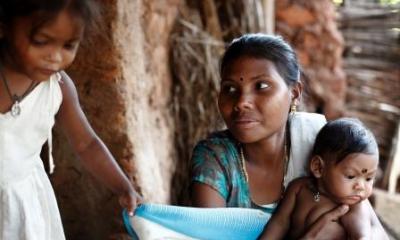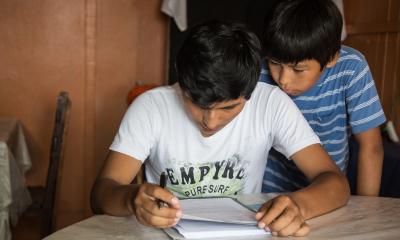Young Lives has ambitious plans to build on the extensive evidence from our 20 year mixed methods study and to expand and innovate our research programme to adapt to rapid global change.
Young Lives is currently fundraising for research and core funding.
Core Funding
Core funding is crucial to ensuring Young Lives' future and continuing to follow the lives of the millennium children. We plan to follow our younger cohort to the end of their third decade, involving an 8th survey round, and aligning with the 'birth to thirty' milestone and the culmination of the Sustainable Development Goals in 2030.

We are currently seeking significant multi-year core funding (2026 - 2030) to deliver Young Lives' full suite of research to policy impact activities including mixed methods data collection, and research analysis, policy, communications and programme management functions. We are exploring consortium funding arrangements and potential new partnerships with individuals, foundations and bilateral donors.
Research Funding
Research funding is vital to deliver innovative policy relevant research using both primary and secondary data analysis. Our priority new research areas, which reflect Young Lives' added value to deliver ground breaking research and that we are fundraising for, include:
- climate change and environmental shocks
- skills development over the life course
- mental health and well-being
We have an exciting new opportunity to invest in a bold, ambitious 'Young Lives Research Hub on Climate Change and Environmental Shocks', which will generate, for the first time, important policy relevant evidence on the long term effects of shocks on human development, across the life-course and across two generations of children and young people. This will include the impacts of extreme weather shocks experienced throughout infancy, childhood and adolescence, such as droughts, flooding and rising temperatures, as well as increasing air pollution. We believe that this new area of research has the potential to re-frame global debates on climate change, with important policy implications for improving young people's lives, and meeting the 2030 SDG's.
Young Lives is looking to partner with like-minded individuals, corporations or foundations to help deliver our ambitious new Hub. We are keen to explore opportunities for consortium funding as working in partnership will maximise our potential impact across a range of policy areas critical to addressing the impacts of climate change, environmental shocks and pollution in LMIC's and meeting the SDG's.
Please contact Dr Marta Favara, Director of Young Lives marta.favara@qeh.ox.ac.uk and Kath Ford, Senior Policy Advisor Katherine.ford@qeh.ox.ac.uk if you would like to take the conversation forward.
Young Lives has ambitious plans to build on the extensive evidence from our 20 year mixed methods study and to expand and innovate our research programme to adapt to rapid global change.
Young Lives is currently fundraising for research and core funding.
Core Funding
Core funding is crucial to ensuring Young Lives' future and continuing to follow the lives of the millennium children. We plan to follow our younger cohort to the end of their third decade, involving an 8th survey round, and aligning with the 'birth to thirty' milestone and the culmination of the Sustainable Development Goals in 2030.

We are currently seeking significant multi-year core funding (2026 - 2030) to deliver Young Lives' full suite of research to policy impact activities including mixed methods data collection, and research analysis, policy, communications and programme management functions. We are exploring consortium funding arrangements and potential new partnerships with individuals, foundations and bilateral donors.
Research Funding
Research funding is vital to deliver innovative policy relevant research using both primary and secondary data analysis. Our priority new research areas, which reflect Young Lives' added value to deliver ground breaking research and that we are fundraising for, include:
- climate change and environmental shocks
- skills development over the life course
- mental health and well-being
We have an exciting new opportunity to invest in a bold, ambitious 'Young Lives Research Hub on Climate Change and Environmental Shocks', which will generate, for the first time, important policy relevant evidence on the long term effects of shocks on human development, across the life-course and across two generations of children and young people. This will include the impacts of extreme weather shocks experienced throughout infancy, childhood and adolescence, such as droughts, flooding and rising temperatures, as well as increasing air pollution. We believe that this new area of research has the potential to re-frame global debates on climate change, with important policy implications for improving young people's lives, and meeting the 2030 SDG's.
Young Lives is looking to partner with like-minded individuals, corporations or foundations to help deliver our ambitious new Hub. We are keen to explore opportunities for consortium funding as working in partnership will maximise our potential impact across a range of policy areas critical to addressing the impacts of climate change, environmental shocks and pollution in LMIC's and meeting the SDG's.
Please contact Dr Marta Favara, Director of Young Lives marta.favara@qeh.ox.ac.uk and Kath Ford, Senior Policy Advisor Katherine.ford@qeh.ox.ac.uk if you would like to take the conversation forward.




